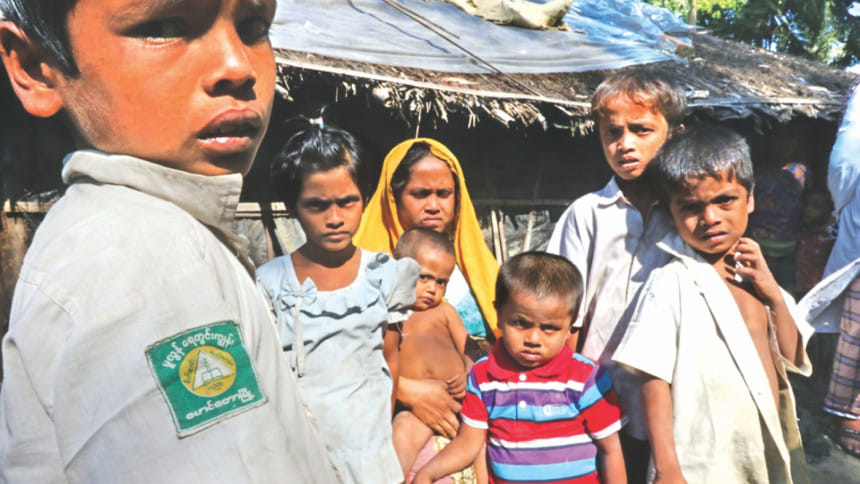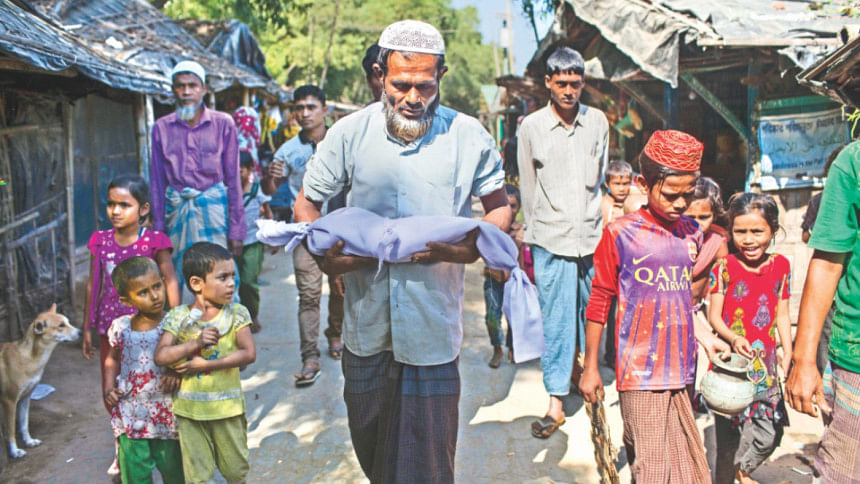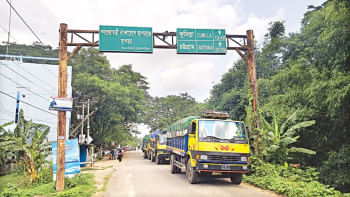Myanmar's Rohingyas: Many go to Cox's Bazar, beyond

Three brothers -- Omar Farukh, Omar Khayer and Omar Sadeque -- were still in school uniform which had the logo of their school in Myanmar. The white shirts of the boys, aged between 8 and 10, became quite dirty as they had been wearing them for over a week.
On Friday night, they along with their mother, Shamsunnahar, 34, and three younger siblings reached the Nazirartek dry fish processing zone in Cox's Bazar town.
Their father, Hossain Ahmed, a farmer from Bar Gazobil village in Myanmar, has been missing since Myanmar police arrested him two weeks ago.
“We crossed the Naf river on Thursday morning and reached the fisheries project area near Rongikhali. There, BGB men stopped us and gave us food. Later that evening, they sent us back in our boat,” said Shamsunnahar.
However, they returned and managed to reach the unregistered Rohingya camp at Leda in Teknaf. Later, they went to Nazirartek where Shamsunnahar's mother Rahima Khatun has been living for the last eight years.

“Four of my children used to go to school. Now, I will have to work here just to survive,” Shamsunnahar told The Daily Star in front of her mother's rented house.
The rent for an eight feet by six feet hut in Nazirartek is only Tk 400 and many of the Rohingyas who are crossing into Bangladesh from Myanmar have been living in the area.
Many Myanmar citizens, like Mariam Khatun, Fatema Begum, Khaleda Begum and Khurshida Begum, who have taken shelter there, are working as day labourers.
On the other hand, many were getting into different slums in Cox's Bazar town, Chittagong, Bandarban and other districts, due to the absence of proper monitoring.
Contacted, Ali Hossain, deputy commissioner of Cox's Bazar, claimed that different government intelligence agencies and law enforcers were monitoring the matter.
“But still many of them [Rohingyas] are spreading to different places because they have relatives who have been living in Bangladesh for many years. Those relatives are helping them,” he said.
However, Abu Morshed Chowdhury Khoka, president of Cox's Bazar Civil Society, a platform of citizens in the district, claimed that the spreading of Rohingyas to different places in Bangladesh would have a negative impact on the society. “They [Rohingyas] are getting involved in crimes.” he said.
It is necessary to keep all the Rohingyas at a certain place with the help of the UNHCR,” said Khoka. He urged the government to take necessary steps in this regard.
The Rohingyas were stilling coming into Bangladesh through the Naf river despite increased vigilance by law enforcers.
Bangladesh Border Guard (BGB) said they had to send back four boats full of Rohingyas yesterday in the river.
Meanwhile, a five-month-old child died of cold-related disease early yesterday at the unregistered Rohingya camp at Leda in Teknaf. He along with family had reached the camp on Friday evening hours after crossing into Bangladesh.
“He was having severe cold and cough,” said Nur Begum, his mother.
Nur Begum said they came to the Leda camp on Friday along with 40 other Myanmar citizens.
PANIC IN RAKHINE VILLAGE
Rakhine people in Teknaf have been living in panic since the Rohingyas started to cross into Bangladesh recently.
“It is very natural that we are scared. Situation is bad in Myanmar. The wind may start blowing towards us here in Bangladesh,” said Ching Cho Aung, president of New Chang Prue Keyang in Hnila Chowdhury Para in Teknaf.
However, the government has been taking initiatives to protect them from any untoward situation.
“Every night, police are patrolling our village. Police have been deployed at the entrance of our village,” he said.
Only 120 Rakhine families are living in Hnila Chowdhury Para which is just three kilometers off the Leda Rohingya camp.
HOME MINISTER ON ROHINGYAS
Rohingyas are coming to Bangladesh crossing the Naf river though the country is overburdened by them, Home Minister Asaduzzaman Khan said yesterday.
He was addressing a programme as chief guest in Naogaon, reports our correspondent in Dinajpur.
Later, Asaduzzaman told reporters that the Rohingyas are coming in despite the BGB working round the clock on the border to stop them. On the other hand, the government is also taking care of the Rohingyas and they are getting all kinds of support including medical treatment, he added.
BNP ON ROHINGYAS
The BNP yesterday urged the government to stand beside the oppressed and displaced Rohingyas of Myanmar, reports our correspondent.
“Every day we see news that Rohingya people are being brutally tortured and burnt to death in Myanmar. Though Bangladesh's 90 percent population is Muslims, its government is least bother about it,” senior leader Khandaker Mosharraf Hossain said at a discussion at the party's Nayapaltan central office in the capital.
'I DON'T WANT TO DIE'
For heavily-pregnant Siru Bibu, who fled by boat with four children after her husband and other relatives were allegedly killed by an army operation, the situation that has greeted them was dire.
"If it goes another week, my children will starve," said Siru at the unregistered Rohingya camp at Teknaf.
"Anyone trying to help us is warned or being arrested. As a result, the newly arrived refugees are living in fear," a camp elder told AFP, requesting anonymity.
"Police have arrested some of our neighbours and we heard that they were sent back across the border," Yasmin Akhter, a 25-year-old mother who was only able to bring two of her six children to Bangladesh.
"I hope they won't do it to us... I don't want to die."

 For all latest news, follow The Daily Star's Google News channel.
For all latest news, follow The Daily Star's Google News channel. 



Comments